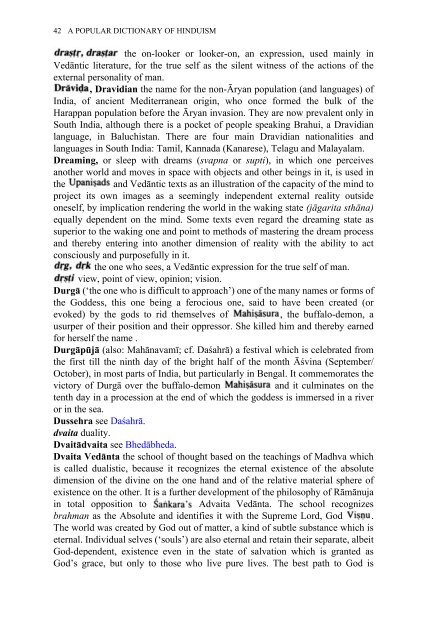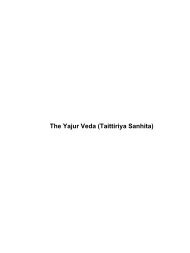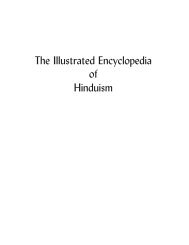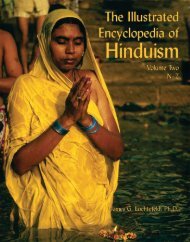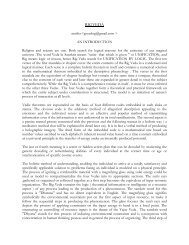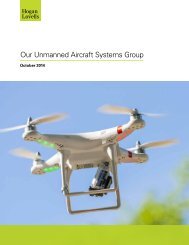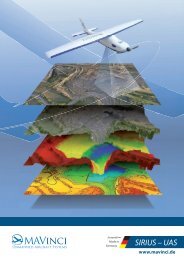Create successful ePaper yourself
Turn your PDF publications into a flip-book with our unique Google optimized e-Paper software.
42 A POPULAR DICTIONARY OF HINDUISM<br />
the on-looker or looker-on, an expression, used mainly in<br />
Vedāntic literature, for the true self as the silent witness <strong>of</strong> the actions <strong>of</strong> the<br />
external personality <strong>of</strong> man.<br />
, Dravidian the name for the non-Āryan population (and languages) <strong>of</strong><br />
India, <strong>of</strong> ancient Mediterranean origin, who once formed the bulk <strong>of</strong> the<br />
Harappan population before the Āryan invasion. They are now prevalent only in<br />
South India, although there is a pocket <strong>of</strong> people speaking Brahui, a Dravidian<br />
language, in Baluchistan. There are four main Dravidian nationalities and<br />
languages in South India: Tamil, Kannada (Kanarese), Telagu and Malayalam.<br />
Dreaming, or sleep with dreams (svapna or supti), in which one perceives<br />
another world and moves in space with objects and other beings in it, is used in<br />
the and Vedāntic texts as an illustration <strong>of</strong> the capacity <strong>of</strong> the mind to<br />
project its own images as a seemingly independent external reality outside<br />
oneself, by implication rendering the world in the waking state (jāgarita sthāna)<br />
equally dependent on the mind. Some texts even regard the dreaming state as<br />
superior to the waking one and point to methods <strong>of</strong> mastering the dream process<br />
and thereby entering into another dimension <strong>of</strong> reality with the ability to act<br />
consciously and purposefully in it.<br />
the one who sees, a Vedāntic expression for the true self <strong>of</strong> man.<br />
view, point <strong>of</strong> view, opinion; vision.<br />
Durgā (‘the one who is difficult to approach’) one <strong>of</strong> the many names or forms <strong>of</strong><br />
the Goddess, this one being a ferocious one, said to have been created (or<br />
evoked) by the gods to rid themselves <strong>of</strong><br />
, the buffalo-demon, a<br />
usurper <strong>of</strong> their position and their oppressor. She killed him and thereby earned<br />
for herself the name .<br />
Durgāpūjā (also: Mahānavamī; cf. Daśahrā) a festival which is celebrated from<br />
the first till the ninth day <strong>of</strong> the bright half <strong>of</strong> the month Āśvina (September/<br />
October), in most parts <strong>of</strong> India, but particularly in Bengal. It commemorates the<br />
victory <strong>of</strong> Durgā over the buffalo-demon<br />
and it culminates on the<br />
tenth day in a procession at the end <strong>of</strong> which the goddess is immersed in a river<br />
or in the sea.<br />
Dussehra see Daśahrā.<br />
dvaita duality.<br />
Dvaitādvaita see Bhedābheda.<br />
Dvaita Vedānta the school <strong>of</strong> thought based on the teachings <strong>of</strong> Madhva which<br />
is called dualistic, because it recognizes the eternal existence <strong>of</strong> the absolute<br />
dimension <strong>of</strong> the divine on the one hand and <strong>of</strong> the relative material sphere <strong>of</strong><br />
existence on the other. It is a further development <strong>of</strong> the philosophy <strong>of</strong> Rāmānuja<br />
in total opposition to<br />
Advaita Vedānta. The school recognizes<br />
brahman as the Absolute and identifies it with the Supreme Lord, God .<br />
The world was created by God out <strong>of</strong> matter, a kind <strong>of</strong> subtle substance which is<br />
eternal. Individual selves (‘souls’) are also eternal and retain their separate, albeit<br />
God-dependent, existence even in the state <strong>of</strong> salvation which is granted as<br />
God’s grace, but only to those who live pure lives. The best path to God is


